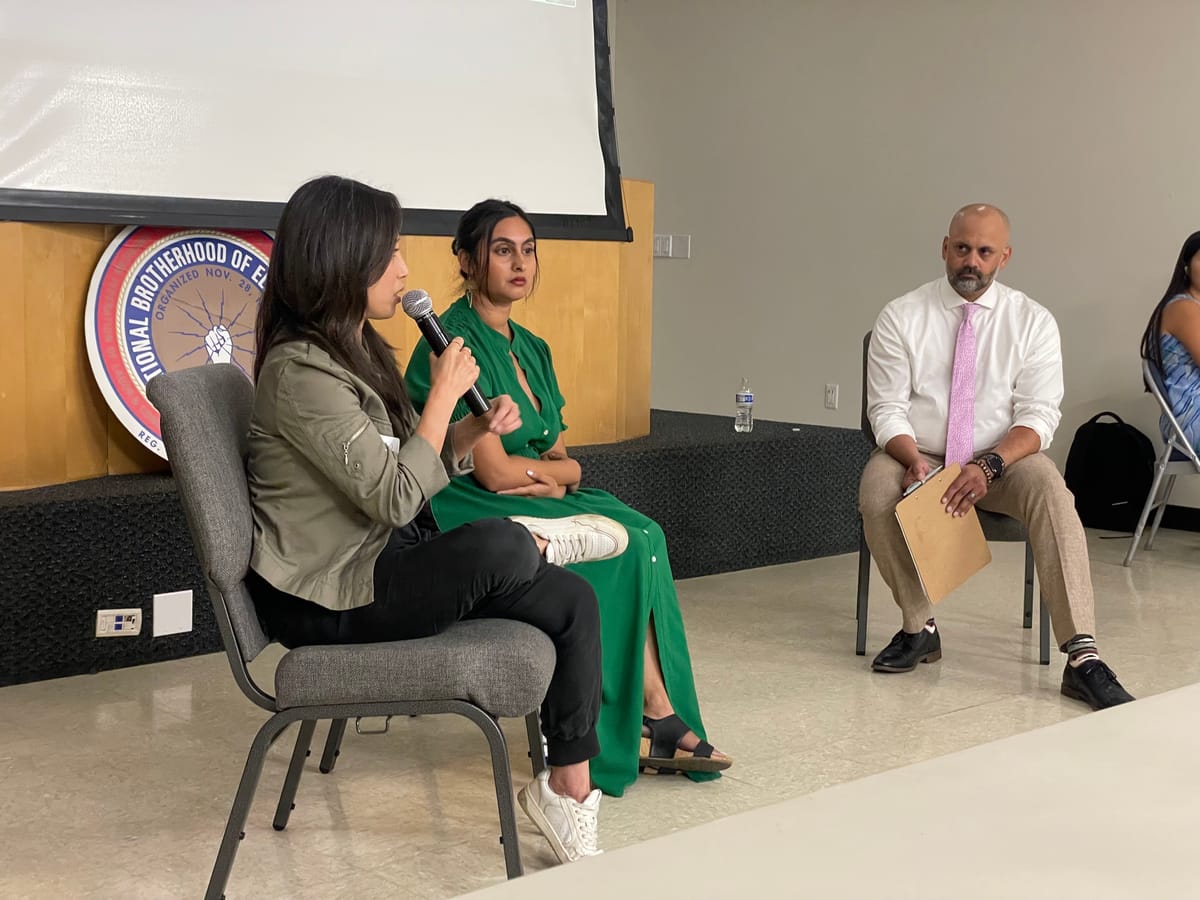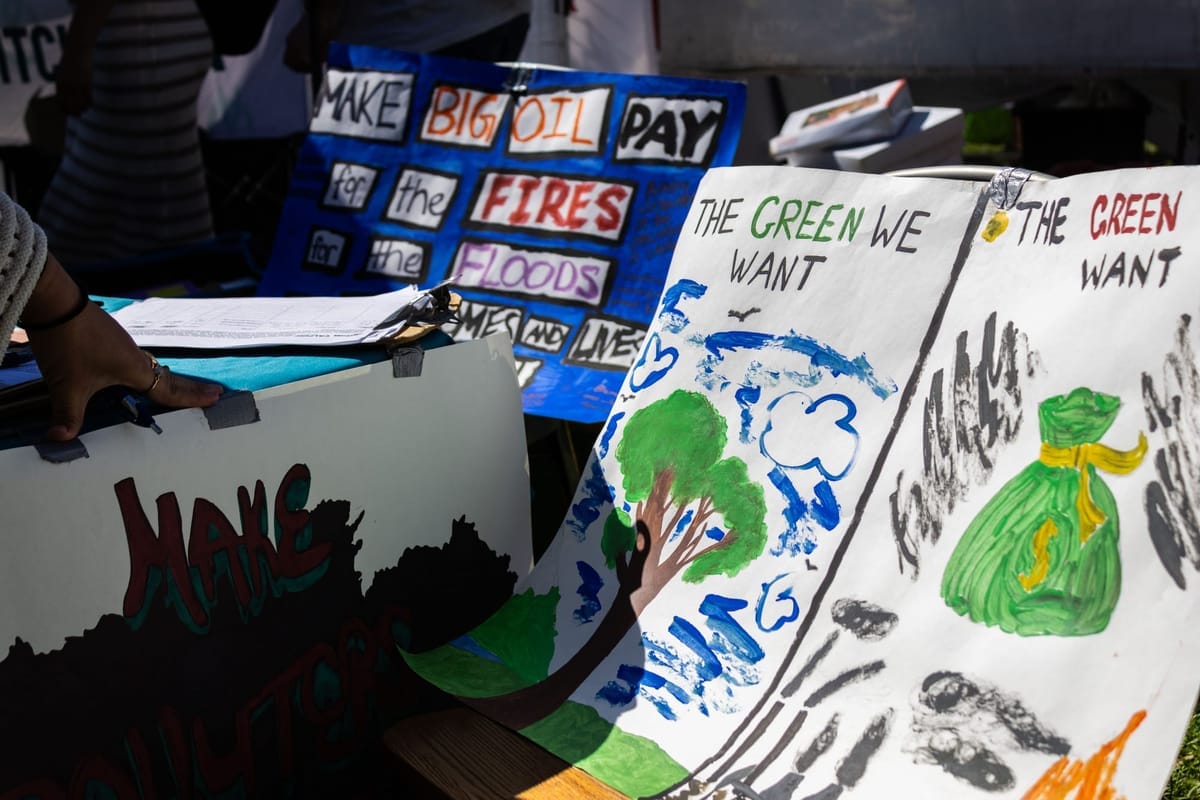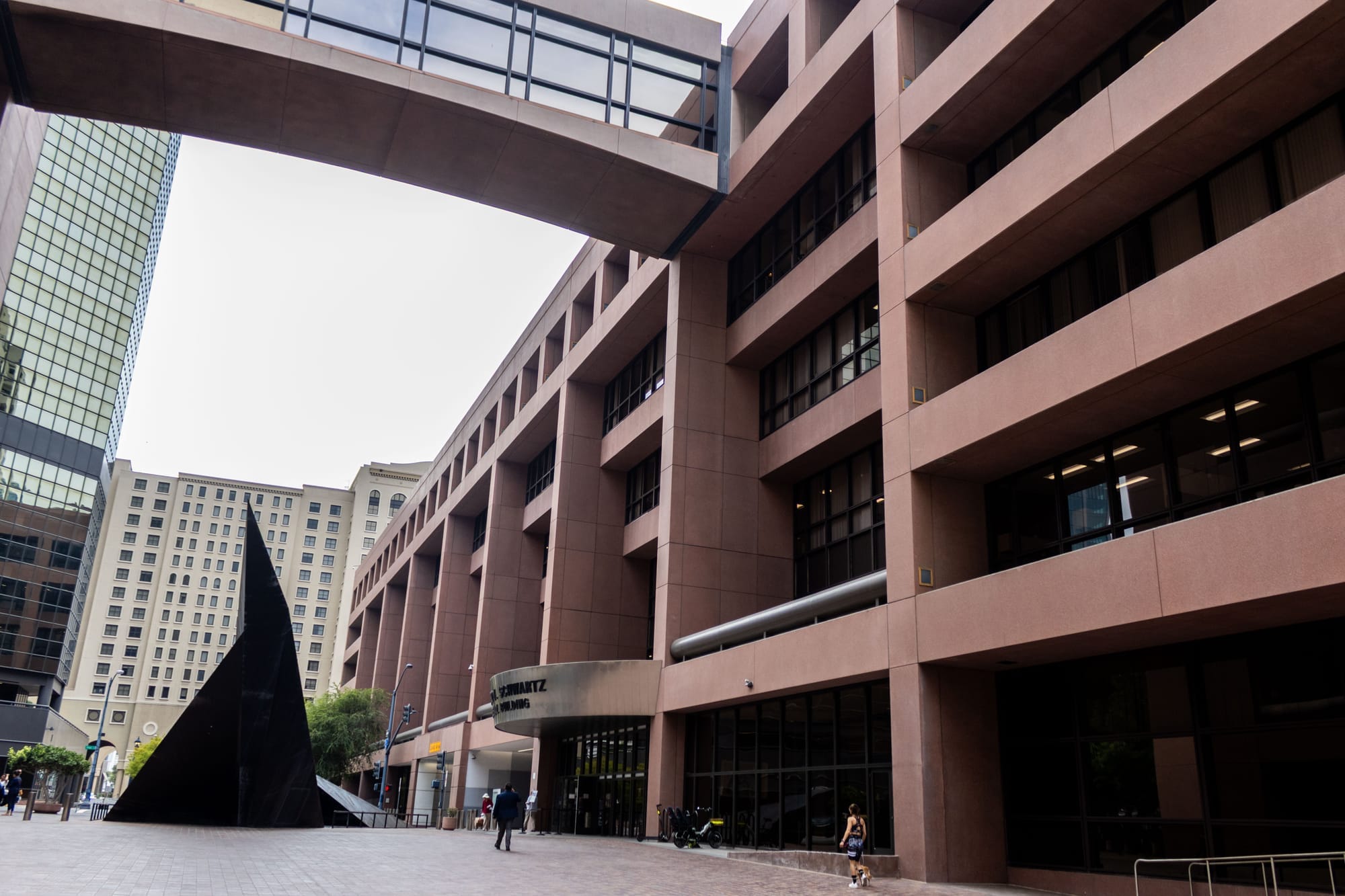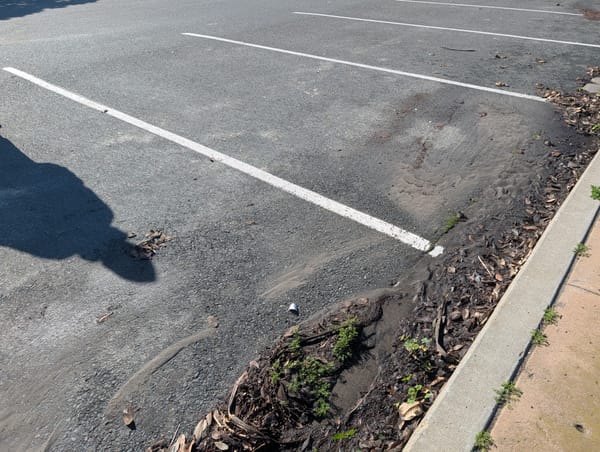‘Suffering in silence:’ Advocates shed light on immigration enforcement’s impact on AAPI communities

At a panel hosted by the AAPI Democratic Club of San Diego, political and community leaders discuss the Trump administration’s immigration policies through the lens of Asian American and Pacific Island immigrants.
Written by Maya Srikrishnan, Edited by Lauren Mapp
Hi everyone!
From policies targeting international student visas and H-1B visas to widespread community raids, the federal government’s immigration enforcement has hit Asian American and Pacific Islander communities hard.
Political and community leaders from throughout California spoke about the toll the Trump administration’s immigration policies are taking on AAPI communities at a panel organized by the AAPI Democratic Club of San Diego Wednesday.
“There is so much suffering in silence that our community is experiencing right now,” said Harris Mojadedi, chair of the Asian Pacific Islander Caucus for the California Democratic Party, who appeared via Zoom to speak at the event from the Bay Area.
Mojadedi said the rhetoric coming out of Washington, DC over the past few weeks regarding H-1B visas has “devalued actual human lives.” It’s centered around what people in the AAPI community “can do in our labor, and not necessarily that we're whole human beings that really deserve that basic level of respect.”
He also emphasized that not just tech workers are here on H-1B visas, but also doctors working in rural parts of the United States, and other fields where important work is being done. People working under H-1B visas are already more vulnerable, Mojadedi said. “because their livelihood is tied to how much they can produce to their employer, and so the ability for them to be taken advantage of or harmed is especially high to begin with.”
Southeast Asian immigrants have faced unique challenges, said Thao Ha, founder of Collective Freedom, an organization that works with Southeast Asians who deal with the criminal legal and immigration systems.
Many Vietnamese, Cambodian and Laotian immigrants whose deportation orders have been on indefinite hold for years have been detained and deported after showing up for check-ins at U.S. Immigration and Customs Enforcement offices, Ha said. In most cases, ICE hadn’t gone through with the deportations because their home countries didn’t recognize them as citizens, or readily issue repatriation documents. Sometimes they were brought to the U.S. as children after being born in refugee camps, so getting birth certificates is nearly impossible.
“Refugees, such as myself, come to America and are placed in very low, underfunded, hyper-policed areas, and young people get in trouble,” she said. “So we get caught in the school-to-prison-to-deportation pipeline.”
Ha emphasized that many of the people she works with are now in their 50s, 60s and even 70s and have children and grandchildren in the U.S.
“I think the psyche of our southeast Asian American communities is one of resignation,” she said. “People are coming to face the reality that deportation is there in their future, and reconciling with how to prepare for that.”
Ha said her organization has been working with volunteers in immigrants’ home countries to help with resettlement.
The panelists also talked about the importance of policies that can be put in place at the local level for these immigrant communities.
Zahra Hajee, communications deputy for Los Angeles County Supervisor Lindsey P. Horvath, noted that LA county recently passed a $30 million rent relief program for immigrant families who are unable to work or otherwise economically impacted by the ICE raids. The county is also exploring an eviction moratorium.
“We're at a point now in our nation where, like, all rules are out the window,” she said. “The Trump administration is — forgive my language — doing whatever the fuck it wants, right? So, we need leaders that have the courage to step up and say, ‘Hey, these are unprecedented times. We need to step up and get creative and be bold in how we are addressing serving our public.’”
Mojadedi emphasized the need for language support, mental and physical health, and human services support from state and local officials.
“We cannot depend on or trust the federal government,” he said. “This federal government in any way, shape or form, and it is now on our mayors, our city council members, our county supervisors, our assembly members to be the first line of defense — our defenders for the services that we need, for the support that we need.”
Ha said there is a lot of narrative shaping that needs to be done to push back on problematic narratives, like the model minority or “good Asian.” Because what’s clear now is whether an immigrant from the AAPI community is here legally or not, whether they have a criminal conviction or not, they’re being targeted.
During the event, University of California San Diego Aryan Dixit, president of the Students’ Civil Liberties Union San Diego, launched the organization’s “Detention Free San Diego” campaign, which aims to address the widespread fear and economic destabilization in immigrant communities by organizing local businesses, schools and community centers to designate private locations within their premises as sanctuaries.
“A big part of the stuff that I've learned is really that no matter what we do, there's always the next crisis, the next problem, the next issue,” said Dixit, who has been helping many international students with visa terminations and other issues.
All the speakers agreed that uniting as a community is essential to survive the current crisis.
“It's the small things that we're able to do to help support and that's really the only solution to what we're feeling right now in this moment,” Hajee said. “There's a lot of despair, but there's a lot of hope that comes from the community's ability to be able to support and uplift and organize with each other during this time.”
— Maya Srikrishnan
San Diego holds first Climate Week
The first ever San Diego Climate Week launched Wednesday with more than 100 events aimed toward increasing sustainability and climate change awareness. Through Oct. 8, San Diegans can choose events to attend throughout the county, including four, free anchor events.
— Lauren J. Mapp

ICE is transferring people in its custody away from family, lawyers
Transfers of people in ICE custody between facilities are becoming more common under the Trump administration, with many being sent far from their family and lawyers. One group from Tacoma, Washington ended up in Alaska, where prison guards pepper sprayed them after one man asked for a phone call.
— Kate Morrissey, Capital & Main

It’s San Diego Climate Week, which means lots of sustainability focused events to attend throughout the county. This week, the region is also hosting an Indigenous wellness conference, a stroll down El Cajon Boulevard and a fundraiser for Detention Resistance.
— Lauren J. Mapp

Other news
The San Diego Housing Commission will require screening for citizenship or legal immigration status for those living in permanent supportive housing, NBC7 reports. Records analyzed by The San Diego Union-Tribune show homeless people’s belongings are rarely stored after encampment sweeps.
UC San Diego faculty says the university’s administration handed over personal information about faculty and students as part of a federal probe into claims of antisemitism on campus and is demanding transparency around its release, Times of San Diego reports.
The County Board of Supervisors approved a move to strengthen the Citizens Law Enforcement Review Board’s ability to probe in-custody death, City News Service reports. In a rare move, the County sued its own jail health care providers over failing to flag a mentally ill man as a violent threat before he killed his cellmate, according to the Union-Tribune.
A City of San Diego ordinance that took effect on Wednesday requires grocery stores to make digital coupons available to everyone, even if they don’t have a smartphone. But Albertsons states the ordinance is limiting the number of discounts and coupons available to customers within the city limits, NBC7 reports.
Upcoming Events
Oct. 4
Hispanic Heritage Month Celebration: The Mt. Hope Neighborhood Group is hosting a Hispanic Heritage Month celebration with music, face painting, and more. The event is family-friendly and free. Oct 4, 10 a.m. - 2 p.m., Dennis V. Allen Park
Peace Vigil for Palestine: CODEPINK San Diego, Palestine Pals and other local activism groups host a weekly peace vigil to advocate for peace in Gaza and beyond every Saturday in Ocean Beach. The group invites attendees to wear pink and bring peace-themed posters. For more information, email sandiego@codepink.org. 10 a.m. to 12 p.m., Sunset Cliffs Blvd. and W Point Loma Blvd., San Diego, CA 92107
Pollination and Migration: Por la Mano Production is hosting a community art show to honor migration. The show is being co-hosted at Tierras Indígenas and Libélula Books & Co. 3-8 p.m., Tierras Indígenas, 2602 National Ave., San Diego, CA 92113; Libélula Books & Co, 950 S 26th St., San Diego, CA 92113
Community Canvass Day: Viet Voices, Mid-City CAN, San Diego API Coalition, and LAOSD are leading a day of canvassing to help local businesses know their rights if Immigration and Customs Enforcement arrives. The group will provide a brief training for volunteers who will then share handouts and other information. 11 a.m. to 2 p.m., City Heights. Register online for more details.
Oct. 5
Dine and Donate: The Cempazuchitl's Library is hosting a fundraiser with Detention Resistance in San Diego and 805 Undocu Fund in the Central Coast at the Llamas Taqueria in National City. There will be food, local vendors, music and mutual aid. All funds will be redistributed to families in collaboration with Detention Resistance and 805 UndocuFund. RSVP here. Oct. 5, 11 a.m. - 6 p.m., Llamas Taqueria, 1430 E Plaza Blvd #E10, National City, CA
Latine Pride: The San Diego LGBTQ+ Latine Coalition is hosting its fifth annual Latine Pride at The Soap Factory. The all-ages event will feature music, food, vendors, community resources, performances and more. Email latine@sdpride.org for more information. Noon to 6 p.m., 2995 Commercial St, San Diego, CA 92113
Crochet & Cabernet: The Block Club is hosting a beginner crochet workshop as part of San Diego Climate Week. The lesson will include wine from Mvinyo Book Bar and a complimentary snack. Tickets are $25. 3-6 p.m., The Block Club, 6403 Imperial Ave, San Diego, CA 92114
Want to support our efforts to bring Daylight to San Diego?
- Subscribe to our newsletter to keep up with the latest community news.
- Make a tax-deductible donation to support our work on Givebutter.
- Tell us If you have an idea or pitch that you think will interest other San Diegans.
- Let us know if you have an event to promote so we can add it to our Events Calendar.
- Help shape our work by filling out the Daylight San Diego Community Survey.
- Hit the follow button on our social media platforms (Instagram, TikTok, X/Twitter, Bluesky, Facebook and YouTube) and share our page with your own community.





